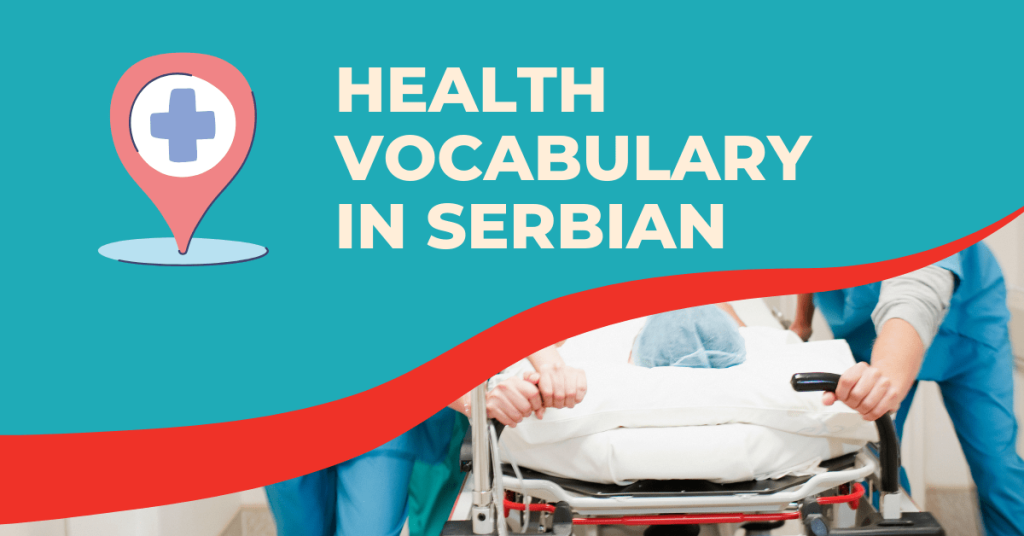The time has come to talk about body and health vocabulary in Serbian as well as some useful Serbian words and phrases related to Health and Illnesses. I hope you’ll never need them, but better be prepared than sorry as Serbians like to say.
So, let’s get started.
The Body
| Serbian (Cyrillic / Latine) | Pronunciation | English Translation |
| тело / telo | teh-loh | body [Sg] |
| тела / tela | teh-lah | bodies [Pl] |
| глава / glava | glah-vah | head [Sg] |
| главе / glave | glah-veh | heads [Pl] |
| лице / lice | lee-tseh | face [Sg] |
| лица / lica | lee-tsah | faces [Pl] |
| око / oko | oh-koh | eye [Sg] |
| очи / oči | oh-chee | eyes [Pl] |
| ухо / uho | oo-hoh | ear [Sg] |
| уши / uši | oo-shee | ears [Pl] |
| нос / nos | noh-s | nose [Sg] |
| носови / nosovi | noh-seh-vee | noses [Pl] |
| уста / usta | oo-stah | mouth [Sg] |
| уста / usta | oo-stah | mouths [Pl] |
| језик / jezik | jeh-zeek | tongue [Sg] |
| језици / jezici | jeh-zee-tsee | tongues [Pl] |
| врат / vrat | vraht | neck [Sg] |
| вратови / vratovi | vrah-toh-vee | necks [Pl] |
| прса / prsaгруди / grudi | prsahgroo-dee | chest [Sg] |
| прса / prsa | prsah | chests [Pl] |
| раме / rame | rah-meh | shoulder [Sg] |
| рамена / ramena | rah-meh-nah | shoulders [Pl] |
| леђа / leđa | leh-djah | back |
| стомак / stomak | stoh-mahk | stomach [Sg] |
| стомаци / stomaci | stoh-mah-cee | stomachs [Pl] |
| срце / srce | sr-ceh | heart [Sg] |
| срца / srca | sr-cah | hearts [Pl] |
| рука / ruka | roo-kah | arm [Sg] |
| руке / ruke | roo-keh | arms [Pl] |
| лакат / lakat | lah-kaht | elbow [Sg] |
| лактови / laktovi | lah-ktoh-vee | elbows [Pl] |
| шака / šaka | shah-kah | hand [Sg] |
| шаке / šake | shah-keh | hands [Pl] |
| рука / ruka | roo-kah | arm [Sg] |
| руке / ruke | roo-keh | arms [Pl] |
| десна шака / desna šaka | deh-snah shah-kan | right hand |
| лева шака / leva šaka | leh-vah shah-kah | left hand |
| прст / prst | pr-st | finger [Sg] |
| прсти / prsti | pr-stee | fingers [Pl] |
| нога / noga | noh-gah | leg [Sg] |
| ноге / noge | noh-geh | legs [Pl] |
| стопало / stopalo | stoh-pah-loh | foot [Sg] |
| стопала / stopala | stoh-pah-lah | feet [Pl] |
| кожа / koža | koh-zhah | skin |
| длака / dlaka | dlah-kah | hair [Sg] |
| длаке / dlake | dlah-keh | hair [Pl] |
| зуб / zub | zoob | tooth [Sg] |
| зуби / zubi | zoo-bee | teeth [Pl] |
| крв / krv | krv | blood |
Health Vocabulary In Serbian: Health And Illnesses
| Serbian (Cyrillic / Latine) | Pronunciation | English Translation |
| здравље / zdravlje | zdrah-vly-eh | health |
| здраво / zdravo | zdrah-voh | healthy |
| здрав / zdrav [m] | zd-rah-v | healthy |
| здрава / zdrava [f] | zdrah-vah | healthy |
| здраво дете / zdravo dete | zdrah-voh deh-teh | healthy child |
| болестан / bolestan [m] | boh-leh-sahn | ill / sick |
| болесна / bolesna [f] | boh-leh-snah | ill / sick |
| болесно дете / bolesno dete | boh-leh-snoh deh-teh | ill / sick child |
| бол / bol | bohl | ache [Sg] |
| болови / bolovi | boh-loh-vee | aches [Pl] |
| Мој […] (ме) боли. / Moj […] (me) boli. | Mohj […] (meh) boh-lee. | My […] aches. / My […] hurts. |
| Мојa […] (ме) боле ./Moja[…] (me) bole. | Moh-jah […] (meh) boh-lee. | My […] ache. / My […] hurt. |
| Боли ме стомак. / Boli me stomak. | Boh-lle meh stoh-mack | I have a stomach ache. |
| Боле ме ноге. /Bole me noge. | Boh-leh meh noh-geh | My legs hurt. |
| доктор / doktorлекар / lekar | doh-ktohr | doctor |
| хирург / hirurg | hee-roo-rg | surgeon |
| aмбуланта / ambulantaординацијa / ordinacija | ahm-boo-lah-ntah | medical office |
| апотека / apotekaдрогерија / drogerija | ah-poh-teh-kahdroh-geh-ree-jah | pharmacy / drugstore |
| болница / bolnica | boh-lnee-tcah | hospital |
| болест / bolest | boh-leh-st | illness |
| вироза / viroza | vee-roh-zah | malady |
| инфекција / infekcija | een-feh-cee-jah | infection |
| вакцина / vakcina | vah-cee-nah | vaccine |
| лек / lek | lehk | medicine |
| таблета / tableta | tah-bleh-tah | pill |
Common Illnesses And Symptoms In Serbian
To effectively communicate your health concerns in Serbian, it’s helpful to be familiar with common illnesses and symptoms. So let’s kick off with some useful Serbian words to refer to when you suffer from aches and pains:
| English | Serbian |
| Illness | Bolest |
| Fever | Groznica |
| Headache | Glavobolja |
| Stomach ache | Bol u stomaku |
| Cough | Kašalj |
| Sore throat | Bolno grlo |
| Allergy | Alergija |
| Fatigue | Umor |
| Nausea | Mučnina |
| Vomiting | Povraćanje |
Medical Professionals And Facilities
In case you need medical attention, knowing the Serbian terms for various medical professionals and facilities can be highly useful. Here are some important words and phrases related to healthcare providers:
| English | Serbian |
| Doctor | Doktor |
| Nurse | Medicinska sestra |
| Hospital | Bolnica |
| Clinic | Klinika |
| Pharmacy | Apoteka |
| Dentist | Zubar |
| Surgeon | Hirurg |
| Specialist | Specijalista |
| Emergency | Hitna pomoć |
| Ambulance | Ambulanta |
Expressing Health Conditions
When describing your health condition, it’s crucial to accurately convey specific symptoms or discomforts. The following phrases will help you express yourself when discussing your health in Serbian.
| English | Serbian |
| I’m not feeling well | Ne osećam se dobro |
| I have a headache/stomach ache | Imam glavobolju/bol u stomaku |
| My stomach hurts | Imam bolove u stomaku |
| My head hurts | Imam glavobolju |
| I have a pain in my chest | Bole me pluća |
| I feel dizzy | Osećam se vrtoglavica |
| I have a fever | Imam groznicu |
| My nose is running | Curi mi nos |
| My throat hurts | Boli me grlo |
| My legs hurt | Bole me noge |
| I need a doctor | Trebam doktora |
| Can you recommend a good clinic? | Možete li preporučiti dobru kliniku? |
| Is there a pharmacy nearby? | Ima li apoteka u blizini? |
| I need medication for my allergy | Trebam lek za alergiju |
Emergency Situations
In case of emergencies, understanding and using emergency-related vocabulary can be critical. Here are some key phrases to remember:
| English | Serbian |
| Help! | Pomoć! |
| Call an ambulance! | Pozovite hitnu pomoć! |
| I’ve been injured | Povredio/la sam se |
| I need immediate medical assistance | Trebam hitnu medicinsku pomoć |
| Is there a hospital nearby? | Ima li bolnica u blizini? |
| Where is the nearest emergency room? | Gde je najbliža hitna soba? |
How Serbian Health Care System Works
Health care institutions perform health care activities on primary, secondary, and tertiary levels.
Primary level: These are institutions that citizens can go to without instructions: health center, pharmacy, student polyclinic, etc. The most important primary level institution is a health center.
Secondary level: If your health center is not able to provide you appropriate specialist health care, your doctor will refer you to the secondary level (hospital). In hospitals of which there are 77 in Serbia, each patient will be provided health care that is required: outpatient treatment (examination by a specialist doctor in a polyclinic) or hospital treatment, that is, lying in that hospital.
Patients are referred to the hospital when their health problem goes beyond the technical home health conditions or if expert opinion is required at higher levels.
Tertiary level: When a health problem exceeds technical requirements hospitals or need a professional opinion of the highest level health care, the patient is referred to clinical centers of which there are 4 in our country (Belgrade, Novi Sad, Kragujevac, and Nis) or one of the clinics (6), or institutes (16) or KBC (4).
It is the tertiary and last level in the health care system in Serbia.
For all visits to the doctor tertiary level required
You have been instructed by your doctor from the health center that he or she issued on the basis of a recommendation from a doctor from the hospital. This instruction must be certified by the competent branches of the Republic Institute for health insurance.
Health Insurance In Serbia
In Serbia, every citizen has the right to health insurance. Citizens who have incomes pay for their health insurance, while for citizens who do not have them,
Health Insurance is paid for by the Republic of Serbia.
We pay for health insurance according to financial possibilities, and we use health care according to their needs.
By paying for health insurance while we are healthy, we provide for ourselves and our family health services in case we get sick, get hurt, or have some emergency interventions, even when we run out of income.
How Serbian Health Insurance Works For Foreign Citizens
The issue of health care of foreigners is regulated by the Law on Health Care.
Foreign citizens, stateless persons and persons who have been recognized as refugees or granted asylum in accordance with international and domestic legislation, who are permanently residing or temporarily residing in the Republic of Serbia, or who pass through the territory of the Republic, have the right to health care, in accordance with The Law on Health Care, unless otherwise determined by an international agreement.
Persons who have the status of refugees from the territory of the republics of the former Yugoslavia exercise the right to health care in accordance with the regulations governing the area of refugees.
Foreigners who meet the conditions for acquiring the status of insured in accordance with the law governing the field of compulsory health insurance receive health care in accordance with these regulations.
The health care of foreigners is provided in the way in which the health care is provided to the citizens of the Republic.
The health institution and private practice, as well as health workers, are obliged to provide emergency medical assistance to the foreigner.
The foreigners themselves bear the costs for the provided emergency medical assistance, as well as for other types of health services that are provided to the foreigner at their request.
For the use of health services, the foreigner pays a fee according to the price list of the health institution, or the price list of the private practice.
From the budget of the Republic, a fee is paid to health institutions and private practice for the indicated emergency medical care to a foreigner, if the health institution or private practice could not collect that fee from the foreigner because he does not have the necessary funds.
For the use of health care of foreign insured persons during their temporary stay in the Republic of Serbia, the branch in whose territory they have a temporary stay is issued by Zdravstveni list – Form INO-1 based on the certificate of the foreign social insurance provider, issued on the appropriate form.
Final Thoughts
I hope you have learned how to name parts of the human body as well as some useful Serbian words and phrases related to Health and Illnesses. As I already said, I hope you’ll never need to use those words. However, if you want to master health vocabulary or to know how to express feelings in Serbian, you should consider using language learning apps. For example, Ling App will help you learn Serbian in a fast, easy, and fun way.



















